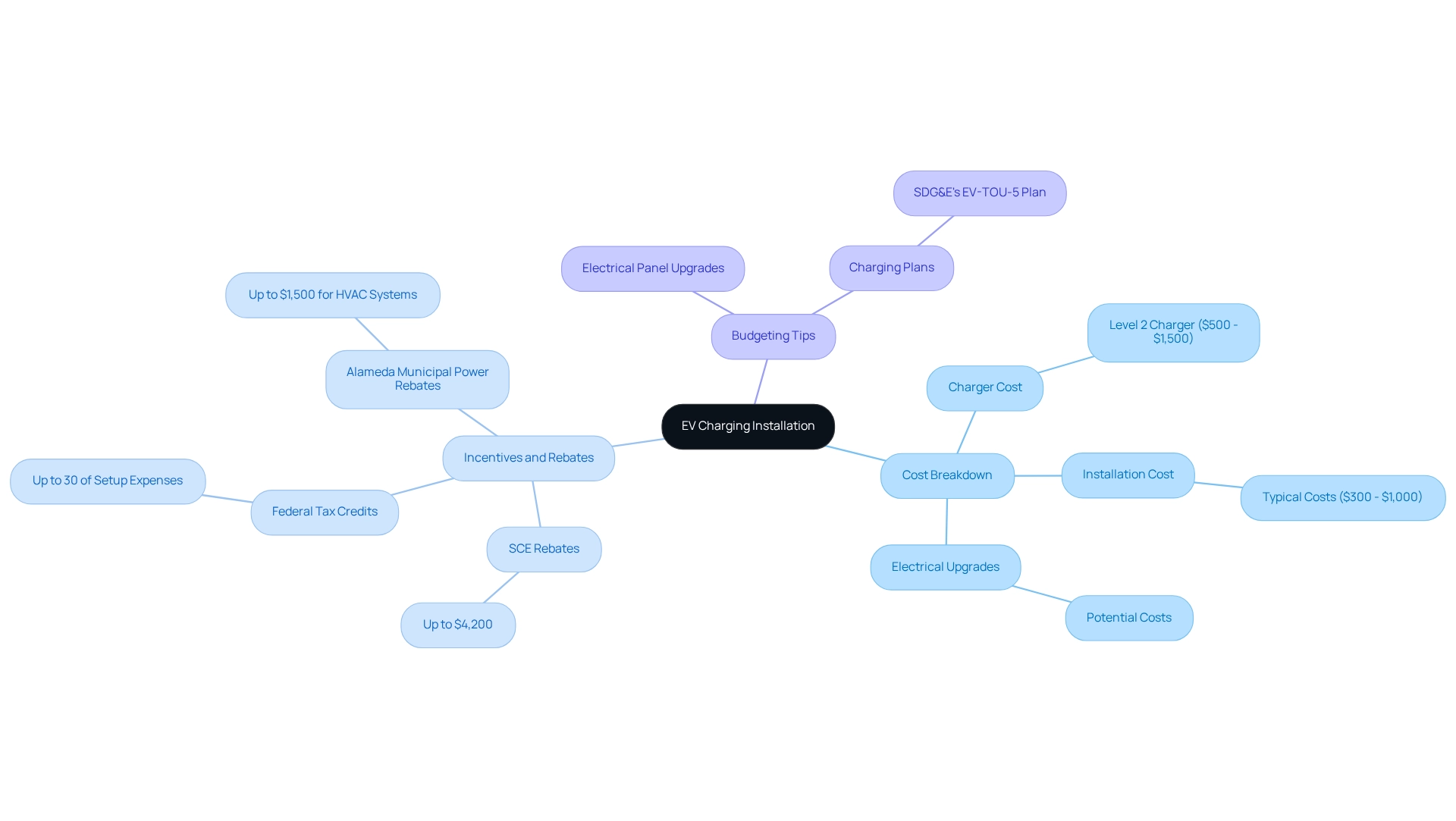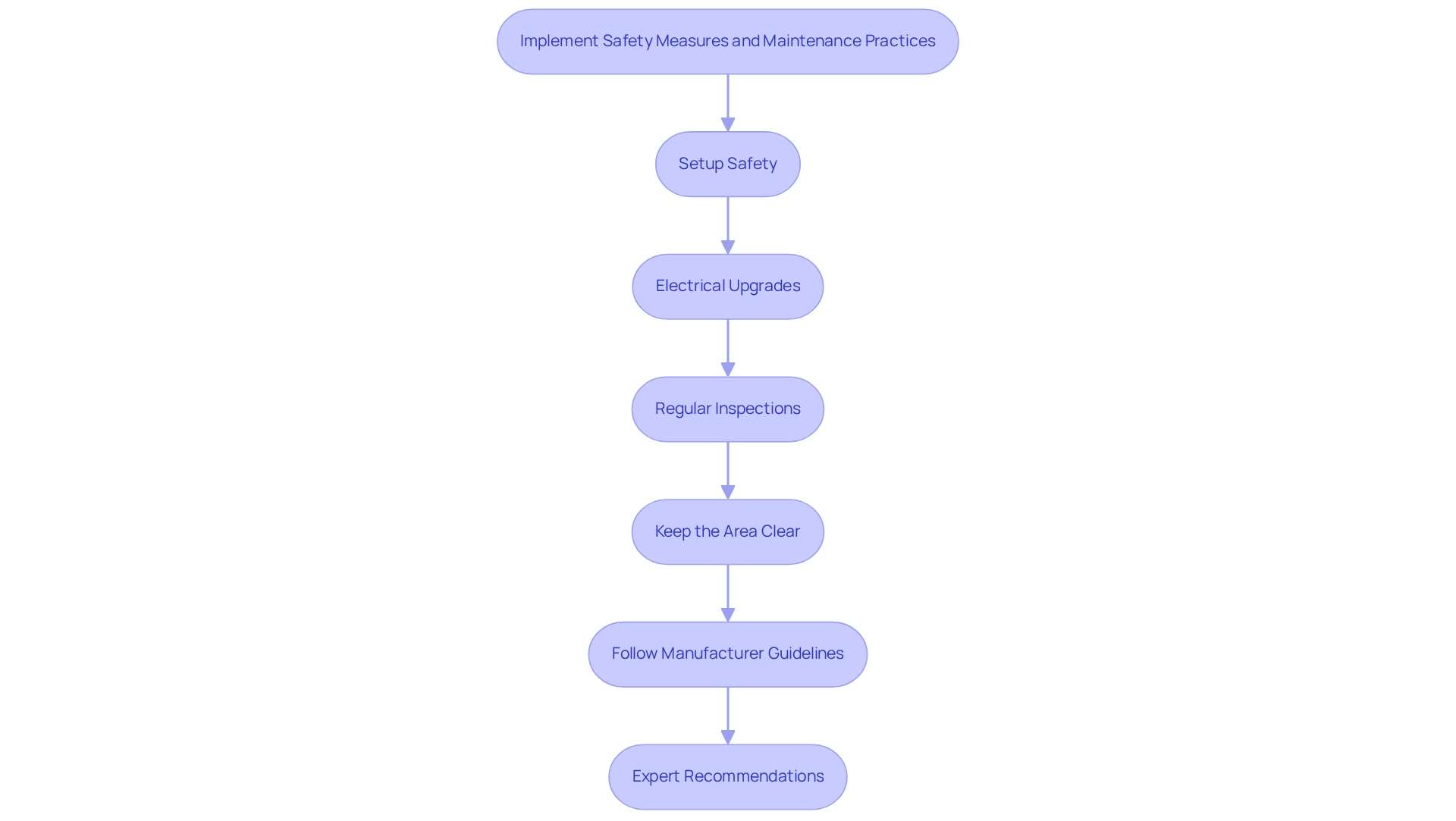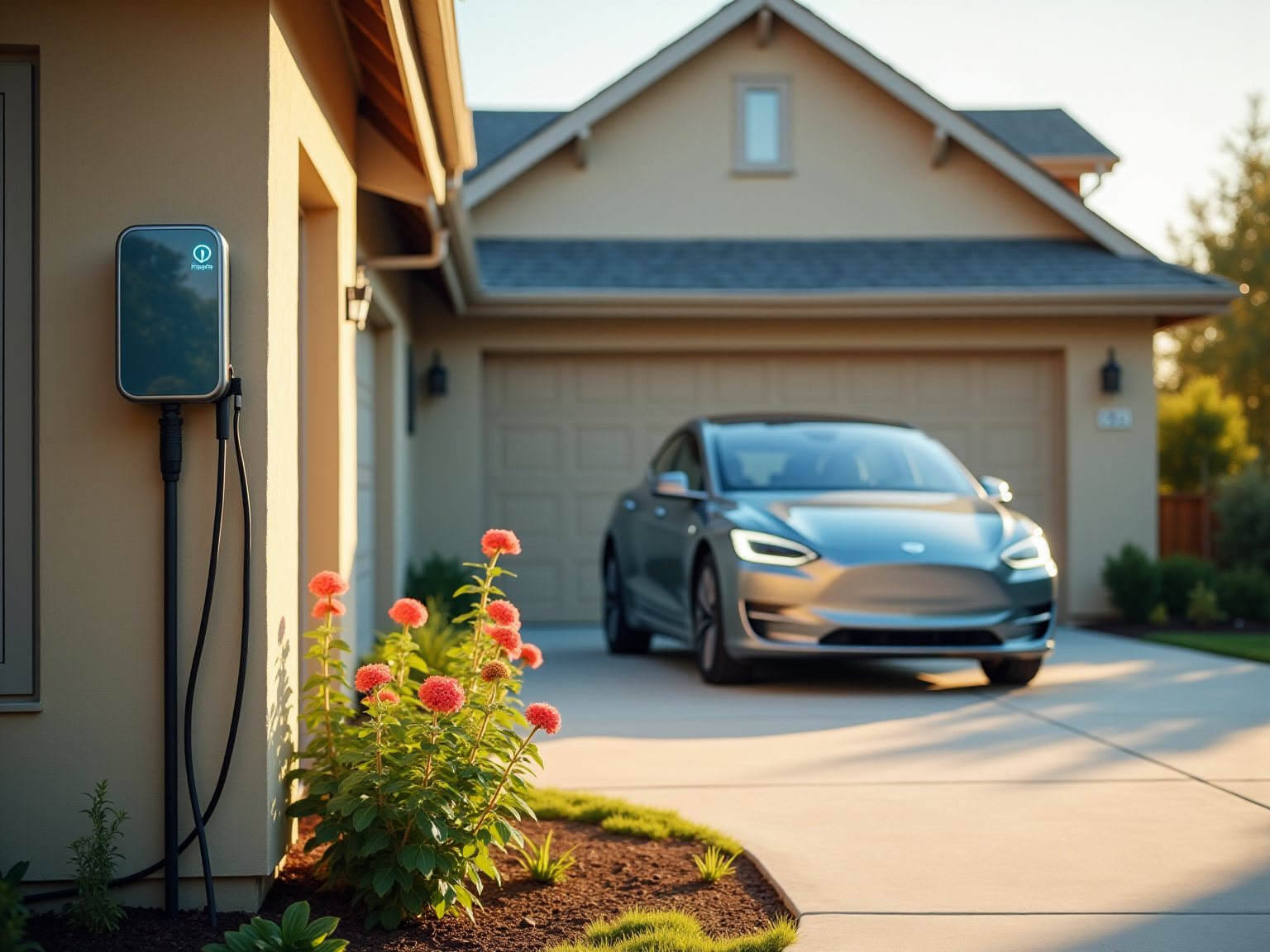Overview
We understand that navigating the world of electric vehicle (EV) charger home installation can feel overwhelming, especially when considering the impact on your energy bills. It’s essential to take a thoughtful approach to this process. The fundamental steps include:
- Understanding the different types of chargers available
- Hiring qualified professionals who can guide you
- Evaluating the costs and available incentives
- Implementing safety measures to protect your home and family
By focusing on these steps, you can select the right charging solution that not only meets your needs but also complies with local regulations.
Moreover, managing installation expenses effectively is crucial. We want you to feel confident in your investment, knowing that it will contribute to your energy independence and long-term savings. Safety is paramount, and these measures ensure that your charging station operates smoothly and securely, allowing you to enjoy the benefits of electric vehicle ownership without worry.
Ultimately, together we can facilitate a seamless transition to a more sustainable lifestyle. If you have any questions or need assistance, please don’t hesitate to reach out. We’re here to support you every step of the way.
Introduction
As electric vehicles (EVs) continue to gain traction, we understand that many homeowners are concerned about rising energy bills and the need for efficient home charging solutions. It’s common to feel overwhelmed by the choices available, but understanding the different types of EV chargers and their installation requirements is essential for making the switch to electric. With options ranging from the slower Level 1 chargers to the much faster Level 2 chargers, each type comes with its own set of considerations, including installation costs and electrical requirements.
Moreover, navigating local regulations and hiring qualified professionals can streamline the installation process, ensuring compliance and safety. This is where we can support you—by providing guidance on how to evaluate costs, explore available incentives, and adopt best practices for maintenance and safety. Together, we can empower you to embrace sustainable energy solutions with confidence, fostering a future that prioritizes energy independence and environmental responsibility.
Understand EV Charger Types and Requirements
As you consider for home installation, it’s important to understand the two primary types available: Level 1 and Level 2 devices. We recognize that managing energy costs is a concern for many homeowners, and choosing the right charging solution can significantly impact your energy bills.
- Level 1 Devices: These devices utilize a standard 120-volt outlet and are generally slower, providing about 4-5 miles of range per hour. While they can be suitable for overnight power replenishment, they may not meet the needs of daily drivers, especially those with longer commutes. The typical installation cost for these devices ranges from $596 to $813, making them a convenient option for urgent or overnight charging needs. A case study titled ‘Cost and Efficiency of Type 1 Chargers’ highlights their affordability and accessibility, reinforcing their practicality in situations where higher output power supply is not feasible.
- Type 2 Charging Devices: In contrast, Type 2 charging devices require a 240-volt outlet and can provide approximately 25 miles of range each hour. This substantial increase in charging speed makes them the preferred choice for most homeowners seeking an ev charger for home installation, particularly those who rely on their EVs for daily transportation. As experts have noted, ‘Type 2 charging devices are common solutions for home and business environments.’ It’s essential to evaluate your electrical panel capacity to ensure it can accommodate the additional load from an ev charger for home installation. We recommend consulting with a qualified electrician, like those at Powercore Electric, to determine if any upgrades are necessary for this more efficient power solution, which includes the installation of an EV charger for home installation, as well as solar panels and battery backups. We believe that every eco-conscious homeowner deserves access to reliable and efficient solutions that support energy independence. For more information or to schedule a consultation, please reach out to Powercore Electric at (916) 699-8778 or via email at ryan.serrano@powercoreinc.net.
Currently, California boasts a robust network of electric vehicle charging stations, with 22,000 fast units available in the U.S., 60% of which are Tesla Superchargers. This infrastructure not only facilitates the growing trend of residential electric vehicle setups but also reflects the increasing acceptance of electric vehicles throughout the state. Together, we can embrace this shift towards sustainable energy solutions.
Hire Qualified Professionals and Navigate Local Regulations
To create for home installation, enlisting qualified experts from Powercore Electric is essential. We understand that homeowners may have concerns about navigating the complexities of EV charger for home installation, which is why prioritizing electricians certified in these setups is so important. These professionals are not only knowledgeable about local regulations but also equipped to guide you through the process.
- Research Local Codes: Before moving forward, it’s wise to consult your local building department to familiarize yourself with the specific codes and permits required for EV power supply setups. Many municipalities mandate permits to ensure safety and adherence to electrical standards, which is crucial for a reliable configuration of for home installation. Choosing electricians from Powercore Electric, who have a proven track record in EV charger for home installation setups, can make a significant difference. Their expertise will cover essential electrical upgrades and streamline the permitting process, ensuring compliance with local regulations.
- Verify Credentials: It’s important to confirm that the electrician holds the appropriate licenses and insurance. This step protects you from potential liability during the installation process, providing peace of mind.
Statistics reveal that only about 45% of property owners fully understand the requirements for EV setups, highlighting the importance of expert assistance. Furthermore, case studies suggest that following a systematic setup procedure—securing permits and employing certified electricians from Powercore Electric—empowers homeowners to ensure compliance and enhance the safety of their power solutions, particularly when considering the installation of an EV charger for home installation, which can not only attract customers but also support sustainability initiatives, contributing to the growth of the electric vehicle market. By following these steps, homeowners can confidently navigate the intricacies of EV equipment setups while promoting the expansion of the electric vehicle market. Additionally, it’s essential to ensure there is adequate space for the EV charging station, allowing enough room for the vehicle to park and for the charging cable to reach.
Evaluate Costs and Explore Incentives for Installation
The expense of setting up an EV charging unit can differ greatly depending on various elements, such as the kind of device, complexity of the setup, and any required electrical improvements. We understand that navigating these costs can be overwhelming, but we’re here to help you make informed decisions.
- Cost Breakdown: Typically, a Level 2 charger varies from $500 to $1,500, not including setup costs. Installation costs typically fall between $300 and $1,000, influenced by the electrician’s rates and the job’s complexity. Understanding these [costs is crucial for homeowners looking to make an informed decision about their EV charger for home installation options](https://momentum-electric.com/7-key-components-of-ev-charger-cost-breakdown-you-should-know). Powercore Electric provides professional setup services for for home installation to guarantee a smooth configuration customized to your home’s particular requirements.
- Incentives and Rebates: It’s common to feel uncertain about the financial aspects of EV charging setups, but California residents can benefit from various incentives. Notably, programs like SCE’s Charge Ready Home Rebate Program offer rebates up to $4,200. Furthermore, federal tax credits can cover up to 30% of setup expenses, making the shift to electric vehicle charging more economical. Powercore Electric can assist you in navigating these incentives to maximize your savings. Additionally, Alameda Municipal Power offers rebates up to $1,500 for new heat pump HVAC systems, illustrating the broader context of financial support for energy-efficient upgrades in California. These incentives significantly lower the overall cost, encouraging homeowners to invest in sustainable energy solutions.
- Budgeting Tips: As you consider your options, it’s important to think about potential costs for electrical panel upgrades, which may be necessary for an EV charger for home installation. Interacting with an expert from Powercore Electric can offer a clearer insight into the overall investment needed, making certain that all elements of the setup are considered. For instance, the San Diego Gas & Electric’s EV-TOU-5 plan allows customers to charge their electric vehicles at home during off-peak hours, promoting cost savings while encouraging the use of electric vehicles. This plan exemplifies how homeowners can benefit from strategic charging practices. With the growing availability of EV rebates and incentives, California residents are increasingly motivated to adopt clean, sustainable energy solutions. As a pleased client mentioned, “Powercore Electric made the setup process simple and effective, and I couldn’t be more content with my new EV charging station!

Implement Safety Measures and Maintenance Practices
To ensure the safe operation of , it’s essential to implement safety measures and maintenance practices that truly care for your needs:
- Setup Safety: We understand that the installation of your EV charger can feel daunting. That’s why it’s important to engage a qualified electrician for the installation of an EV charger for home installation, ensuring compliance with all safety codes. The installation site should be dry, well-ventilated, and free from flammable materials to minimize risks. At Powercore Electric, we conduct a comprehensive site evaluation to identify the optimal placement for your station and assess any electrical needs.
- Electrical Upgrades: It’s common to wonder if your current electrical setup is sufficient. Based on our evaluation, we might need to enhance or adjust it to support your station. This step is vital for guaranteeing that your power supply functions safely and efficiently, giving you peace of mind about the EV charger for home installation. After the site evaluation and necessary electrical improvements are completed, our team will set up your charging station. We ensure it complies with all safety and regulatory requirements. Furthermore, we perform thorough testing and commissioning to guarantee optimal functionality before handing it over to you, so you can feel confident in its operation.
- Regular Inspections: We recommend conducting periodic evaluations of the device and its connections. Look for signs of wear, such as frayed cables or loose connections, and address any unusual indicators of malfunction promptly. Recognizing these signs early can prevent more significant issues and ensure optimal performance, helping you maintain a reliable charging experience.
- Keep the Area Clear: It’s important to maintain a clear space around your charging device to prevent accidents. Ensure that the power cable does not pose a tripping hazard and that the device remains easily accessible for use, fostering a safe environment for everyone.
- Follow Manufacturer Guidelines: Adhering strictly to the manufacturer’s instructions for both use and maintenance is crucial. This includes understanding the correct procedures for connecting and disconnecting the charger, as well as any recommended cleaning practices.
- Expert Recommendations: Regular maintenance is vital for the longevity and safety of your EV charger. Operators should be vigilant for common issues such as overheating or physical damage, which can compromise safety and efficiency. Addressing these concerns promptly can help maintain the effectiveness of your charging infrastructure and enhance user satisfaction. Together, we can ensure that your charging experience is not only safe but also enjoyable.

Conclusion
Understanding the various types of EV chargers and their installation requirements is essential for homeowners who are considering the switch to electric vehicles. We recognize that energy bills can be a concern, and knowing your options can help alleviate some of that stress.
- Level 1 chargers offer a slower charging option suitable for occasional use.
- Level 2 chargers provide significantly faster charging times, making them the preferred choice for daily drivers.
It’s common to feel overwhelmed, but assessing your electrical capacity and consulting with qualified professionals ensures a safe and compliant installation.
Navigating local regulations and hiring experienced electricians can streamline the installation process, ensuring that all safety codes and permits are adhered to. This not only protects homeowners from potential liabilities but also enhances the overall safety and reliability of the charging setup.
Engaging with professionals experienced in EV charger installations, like those at Powercore Electric, can provide invaluable guidance and reassurance throughout the process, making the transition smoother.
Moreover, evaluating the costs associated with installation and exploring available incentives can significantly reduce the financial burden of transitioning to electric vehicle charging.
- With various rebates and tax credits available, homeowners can make informed decisions that align with their budgetary considerations.
- By taking advantage of these incentives, the shift to sustainable energy solutions becomes more accessible and appealing.
Together, we can work towards making this transition as seamless as possible.
Ultimately, embracing electric vehicle charging at home not only supports personal energy independence but also contributes to a broader commitment to environmental responsibility.
By understanding the options available, ensuring proper installation, and maintaining safety protocols, homeowners can confidently adopt this sustainable technology, paving the way for a cleaner, greener future.
Let’s take this step together, ensuring that we create a positive impact for ourselves and the environment.


